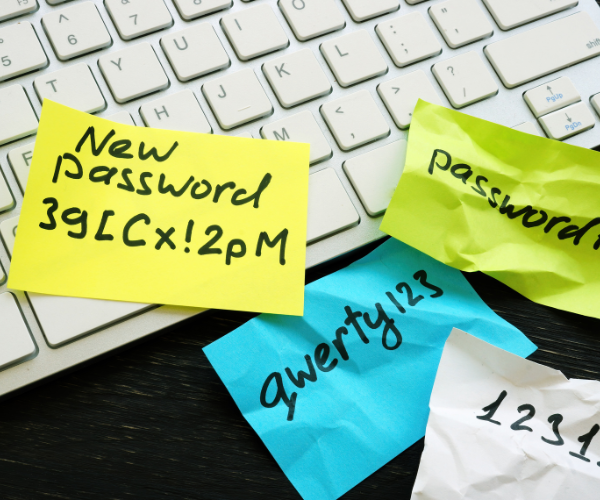Protect Your Information With Password Strength
In today’s digital age, online security is more important than ever. With the rise of cybercrime, protecting electronic patient health information (ePHI) has become a top priority. Sensitive medical information can often be exposed because of data breaches, the act of a malicious hacker, or some other means.
Computer security is the key to protecting assets from cybercrime. The lack of computer security can lead to cyberattacks and is often caused by unauthorized access that could have been prevented. This can result in data breaches, financial losses, and damage to reputation. It’s important for everyone to take computer security seriously and implement best practices, especially for organizations that maintain, create, store, or transmit electronic patient health information (ePHI).
Examining your password strength is the easiest and most reasonable way to maintain healthy security standards and can be the first line of defense to prevent unauthorized access.
Strong Passwords Matter
Passwords are the keys to our online lives. But passwords can also be vulnerable. They can be easily guessed, hacked, or stolen, leaving us open to cybercrimes.
The time it takes for hackers to crack specific lengths and formats of passwords has become increasingly easy. And the time it takes to decipher a password will continue to decrease as more powerful quantum computers come onto the marketplace.
Recently, PrivaPlan Associates completed a penetration test to examine password strength. We discovered in this penetration test of 4,000 users that uncomplicated passwords were easy to figure out. The penetration test showed that 73% of the passwords were decipherable within minutes! While the penetration test relied on powerful computers to decipher the passwords, it was still able to solve a high percentage of passwords that are meant to protect the workforce and patient information.
The Importance of Password Strength
A strong password is essential for protecting your online accounts from unauthorized access.
A strong password:
- Is difficult to guess
- Contains a mix of complexity, including uppercase and lowercase letters, numbers, and symbols
- Is at least 12 characters long, but ideally 16-20 characters
- A strong password is also unique, meaning you don’t use the same password for multiple accounts
The longer and more complex a password is, the harder it is for others to figure out. Using weak passwords or repeating the same password across multiple accounts can put you at risk of cybercriminals gaining access to your online applications. Even passwords that are long but use a common word string such as Welcome2023! are vulnerable to being easily deduced by hackers.
The Importance of Updating Passwords
Changing your password regularly is important for maintaining the security of your online accounts. Even if you have a strong password, it should be changed every three to six months. If your password is compromised, changing it immediately can prevent further unauthorized access.
Updating your password regularly also ensures that you’re not using an old or outdated password that may have been exposed in a data breach. It’s important to note that when updating your password, choose something new and unrelated to your previous passwords.
The Importance of Multi-Factor Authentication
It is also essential to use additional security measures to protect online accounts from unauthorized access and enhance online security.
Multi-factor authentication (MFA) is an additional layer of security that requires users to provide more than one method of authentication to access their accounts. MFA can include:
- Something you know, such as a password
- Something you have, such as a mobile device or security key
- Something you are, such as biometric authentication
Healthcare organizations must prioritize online security measures to protect their patients’ medical information. The additional layer of MFA security makes it more difficult for cybercriminals to access health records, even if they have obtained the password to an account. It can also alert you if someone tries to access your account from an unrecognized device or location. Additionally, MFA can help protect against phishing attacks, where cybercriminals try to trick you into entering your password or other sensitive information.
By requiring multiple forms of authentication, a safe and secure online working environment can be created.
The Importance of Password Managers
Creating strong passwords and updating them regularly can seem like a daunting task, especially if you have multiple accounts. However, several tools, such as Password Managers, are available to help you manage your passwords and ensure they are strong and unique.
Password management tools are a great way to organize your passwords. They store your passwords securely, and many provide a way to back up your passwords and synchronize them across multiple systems. Password management systems also encourage the use of unique passwords. They can even score the effectiveness of a password, and they offer notifications for passwords that may be weak or need to be updated.
How to Implement Password Security Measures
- Require your workforce to follow your organization’s password management policies and procedures.
- Complexity counts when passwords are involved. Encourage using upper and lower case letters, numbers, and special characters. A strong password should use at least three of these choices.
- Enable MFA as an extra option for security.
- Invest in a password manager application for your workforce.
Cyber Security Best Practices
Healthcare providers can significantly reduce the risk of cyberattacks by prioritizing online security measures and training their workforce on cybersecurity best practices. This can include educating the workforce on the following:
- How to recognize phishing attempts. Phishing is still the number one vector for cyberattacks. Train your workforce to be on the lookout for suspicious emails and always be doubtful of hyperlinks.
- How to maintain mobile device security settings such as turning off location tracking and making sure any Wi-Fi network they use on their phone is behind a password and has good security settings and encryption.
- Guide the workforce on securely storing and transferring sensitive data and ensure they know your organization’s policies on data sharing and storage.
Furthermore, healthcare providers should regularly review and update their security measures to ensure they adequately protect patient information. This can include conducting regular risk assessments, penetration testing, and vulnerability scans. It also includes implementing security measures such as firewalls, antivirus software, and intrusion detection systems.
Your Passwords Are Your Protective Shield
Overall, computer security is a critical issue in today’s digital age. By prioritizing online security measures, your organization can enjoy the benefits of the digital age without compromising sensitive health information.
Jump-start your security awareness with one of the most respected HIPAA Phishing Compliance Programs available in the industry! Join PrivaPlan’s Managed Phishing Testing & Cybersecurity Awareness Program today!





